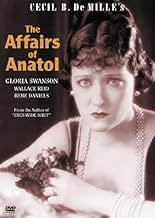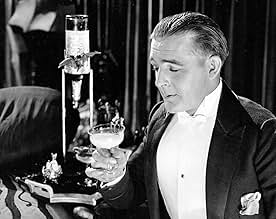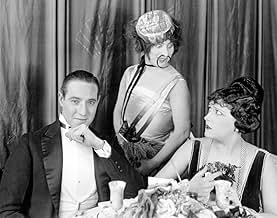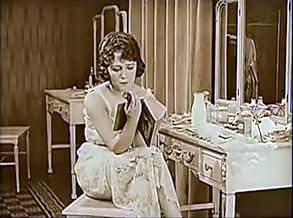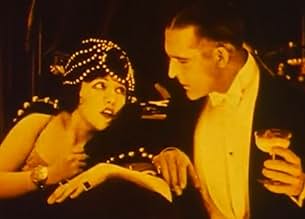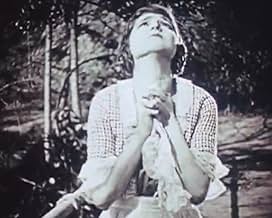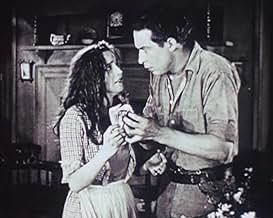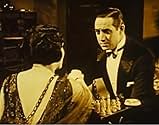Anatol Spencer, homme de haute société, se querelle avec Vivian, son épouse, et flirte avec Emilie qu'il a connue dans sa jeunesse. Il l'installe dans un appartement mais découvre qu'elle le... Tout lireAnatol Spencer, homme de haute société, se querelle avec Vivian, son épouse, et flirte avec Emilie qu'il a connue dans sa jeunesse. Il l'installe dans un appartement mais découvre qu'elle le trompe avec un vieil homme riche, Gordon BronsonAnatol Spencer, homme de haute société, se querelle avec Vivian, son épouse, et flirte avec Emilie qu'il a connue dans sa jeunesse. Il l'installe dans un appartement mais découvre qu'elle le trompe avec un vieil homme riche, Gordon Bronson
- Réalisation
- Scénario
- Casting principal
- Récompenses
- 1 victoire au total
- Vivian's Maid
- (non crédité)
- Chorus Girl
- (non crédité)
- Guest
- (non crédité)
- Chorus Girl
- (non crédité)
- Tibra
- (non crédité)
- Bridge Player
- (non crédité)
- Dr. Johnston
- (non crédité)
- Great Blatsky - Violin Teacher
- (non crédité)
- Stage Manager
- (non crédité)
Avis à la une
The first rescue is of "a bubble-head jazz girl" named Emilie (Wanda Hawley) who is clearly a gold digger, She has poor old Gordon (Theodore Roberts) in her pocket but decides to go after Anatol who thinks he can redeem the poor girl. Meanwhile all she wants is a new victim. There's a great scene of redemption when Anatol tells Emilie she must throw away all her jewels in order to be cleansed. She immediately empties her jewel boxes and puts the empty boxes in a valise. They drive to the river where she throws away the empty boxes. Foolish Anatol believes her but learns the sad truth when he interrupts a wild dinner party Emilie is throwing.
Off to the country for purity and clean air, Anatol and Vivian are rowing in a river when a simple country girl Annie (Agnes Ayres) throws herself off a bridge. They dredge her out and revive her but Annie finds Anatol's wallet on the ground and steals it. After she is "saved" she runs home to husband Abner (Monte Blue) and replaces the money she stole from his church collection box. So much for country purity.
Back in the city Anatol decides to go out on the town, so Vivian decides to wear her :lowest gown" and "highest heals" and go out as well. Anatol falls into the clutches of the notorious nightclub star Satan Synne (Bebe Daniels) who lures Anatol into her den called "the Devil's Cloister." In the middle of vamping him, she gets a couple phone calls. It seems her husband is undergoing an operation for wounds suffered during the World War. When Anatol learns the truth, he gives Satan the money she needs to save her husband.
But back home, he finds Vivian has not come home from her night of clubbing. When she and Max finally come in a 9 AM he demands to know if she's be unfaithful. She refuses to answer. At that moment, a famous hypnotist (Theodore Kosloff) arrives and is compelled by Anatol to secretly put her in a trance and answer his questions. He does, but Max pleads with Anatol that to do this will forever ruin his marriage no matter what the answer is. Will Anatol force the issue? Reid and Swanson are terrific here as the stars, but the fallen women, Hawley, Ayres, and Daniels, all come off well also. Dexter and Blue have little to do. Roberts fumes and Kosloff looks mysterious. And yes that's Polly Moran as the nightclub entertainer.
The film has beautifully colored title cards and boasts nice tinting throughout. This is a must for silent film fans and was an important film for superstars Gloria Swanson, Wallace Reid, and Bebe Daniels.
However, the film could easily have been a half hour shorter with less wear and tear on the viewer and with virtually little loss in the morality tale or sense of the work. It's all enjoyable but it does drag a bit.
Grapevine and Kino both have excellent prints. Important for its director and his non-epic style as well as for the presence of Reid and Swanson, but far from a great or important film.
A long, involved, romantic and slightly moralizing movie about a really good hearted man caught between two women. That's the reason to watch it, that and Gloria Swanson in the lead as the wife. The other woman (Wanda Hawley) is a bit of a siren, and our good fellow is trying to be a charitable fellow with her, and only gets himself in trouble. She plays him like a child.
The year, 1921, is just at the point where the silent film is solidifying and getting sophisticated in a modern sense. There is still a lot of static (fixed) camera in this one (even though one of the photographers was the legendary Karl Struss). This puts the emphasis on the acting, which rises to the occasion. The copy I saw had some great hand colored title cards and some scenes that were toned in rich yellows or other colors, which made it all quite fun. The conflict between the two women, and the intrusion of another man or two, make this a classic soap opera kind of drama, well done and clear enough to follow once you get the basic flow. There are sort of two halves, and the second part out in the country is a nice shift even though the theme remains similar.
Of interest? The director, Cecil B. De Mille, had a hugely influential and long career, and this is toward the beginning, and it shows his tendency to find the popular themes that audiences would connect with, rather than push technical or aesthetic boundaries. Some might call him a populist, interest above all in success, but he was an expert director who knew how to make a movie really coherent, handling the story and actors with precision and a sympathetic feel. And the subject matter here is actually a bit edgy--a married man hanging out with a woman in her most intimate spaces. The play of the "bad" woman against the "good" one is a little expected, of course, but it's such a heartwrenching problem for this nice guy who just wants to help (or so he says), it's painfully enjoyable to watch.
DeMille's work with mirrors is on display, with the director inserting a skeleton image of Mr. Reid in one scene. Reid was a very big star when this film was released (one of the most popular actors in the world); and, though this isn't really representative, it's nice to see him. Of the leading ladies, I enjoyed Ms. Ayres over the others, because her simple scenes with Monte Blue seem so ORDINARY when contrasted with the rest of the goings-on.
DeMille's unlikely mix of titillation, religiosity, and heavy-handed message is obviously in full flower. While there are no performances for the ages, the scenes with Swanson being hypnotized by Theodore Kosloff are fun. Elliott Dexter (as Max Runyon) is the film's best supporting actor; keep a sharp eye on his closing scenes as he'll reveal, through his performance, the affair you might not have been expecting
****** The Affairs of Anatol (9/25/21) Cecil B. DeMille ~ Wallace Reid, Gloria Swanson, Bebe Daniels, Elliott Dexter
Le saviez-vous
- AnecdotesGloria Swanson admitted in an interview decades later that Wallace Reid's drug addiction scared her while they were making this film, and she avoided socializing with him because of it.
- GaffesIn the flashback sequence where Emilie is on a swing and two mirrors are set up to give repeated reflections of the action, the cameraman bending over his camera is visible a few times when the swing moves out of the way.
- Citations
Anatol Spencer: Let's not kiss any more, dear, until after breakfast.
- Versions alternativesFilm Preservation Associates copyrighted a version in 1999 with a music score compiled and performed by Brian Benison. It was produced for video by David Shepard and ran 117 minutes.
- ConnexionsEdited into Faut-il avouer? (1921)
Meilleurs choix
Détails
- Durée
- 1h 57min(117 min)
- Mixage
- Rapport de forme
- 1.33 : 1

